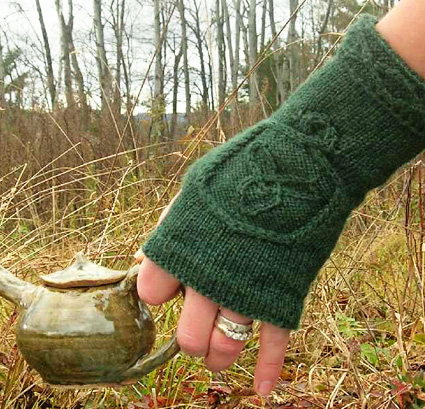|
CUFF
CO 18 sts. Do not join; cuff is worked back and forth
in rows.
Set-up Row [WS]: K8, p1, [k2, p1] twice, k3.
From this point, first st of each row
is slipped.
When working Cuff Chart pattern
as directed below, work as follows:
RS rows: Sl 1 purlwise, work chart row,
k1, p8.
WS rows: Sl 1 knitwise, k7, p1, work
chart row, k1.
Work Rows 1-12 of Cuff Chart 5[5, 6, 6, 7] times, then
work 1[7, 0, 5, 0] more rows in pattern following Rows
13 and 14 of chart.
Cuff measures approx. 6[6.5, 7, 7.5,
8] inches.
BO all sts.
Break yarn, leaving a tail approx. 6 inches long. Use
tail to sew CO edge to BO edge, lining up sts of cable.
Lozenge shape formed by cable pattern at join may be longer
than other lozenge shapes.
WRIST
Turn cuff inside out, so that WS is facing out. Sts
will be picked up along edge of cuff lining (the portion
of the cuff that was worked in reverse stockinette st).
Once mitten is completed, cabled portion of cuff will be
folded up over cuff lining and sewn in place.
With WS (stockinette st side) facing and beginning at
seam, pick up and k 43[45, 49, 53, 57] sts (approx. 2 sts
for every 3 rows) evenly around edge of cuff lining. Round
begins at cuff seam.
Divide sts between three needles so that
there are 11[12, 14, 16, 18] sts on first and third needles
of round (Needles 1 and 3), and 21 sts on second needle
of round (Needle 2). Wrist will be worked in the round.
Work in stockinette st until work measures 1 inch from
picked-up edge.
Next Round: K to end of Needle 1, work Row 1 of Hand Chart
over sts on Needle 2, to end of Needle 3.
From this point, work Hand Chart over
sts on Needle 2.
Continue in pattern until you have completed Row 12 of
Hand Chart.
THUMB GUSSET
Set-up round for Thumb Gusset is worked differently
for right and left hands. As you work thumb gusset, continue
to work Hand Chart over sts on Needle
2, and work all other sts in stockinette st.
Left Hand:
Set-up Round: K8[8, 10, 12, 13], place
marker, work in pattern to end of round.
Right Hand:
Set-up Round: Work in pattern to end
of Needle 2, k first 2[3, 3, 3, 4] sts of Needle 3, place
marker, k to end of round.
Both Hands:
Round 1: Work in pattern to marker, slip
marker, m1, k1, m1, work in pattern to end of round.
Rounds 2-3: Work in pattern.
Round 4: Work in pattern to marker, slip
marker, m1, k3, m1, work in pattern to end of round.
Rounds 5-6: Work in pattern.
Round 7: Work in pattern to marker, slip
marker, m1, k5, m1, work in pattern to end of round.
Size XS Only:
Continue in pattern until Row 27 of Hand
Chart has been completed. Proceed to Thumb opening.
Sizes S, M Only:
Rounds 8, 9: Work in pattern.
Round 10: Work in pattern to marker,
slip marker, m1, k7, m1, work in pattern to end of round.
Continue in pattern until Row -[29, 31,
-, -] of Hand Chart has been completed. Proceed to Thumb
opening.
Sizes L, XL Only:
Rounds 8, 9: Work in pattern.
Round 10: Work in pattern to marker,
slip marker, m1, k7, m1, work in pattern to end of round.
Rounds 11, 12: Work in pattern.
Round 13: Work in
pattern.
Round 14: Work in pattern to marker,
slip marker, m1, k9, m1, work in pattern
to end of round.
Continue in pattern until Row -[-, -,
33, 38] of Hand Chart has been completed.
For size L, proceed to Thumb opening.
For size XL, k 1 more round, then proceed
to Thumb opening.
THUMB OPENING
Note: Once all rows of Hand Chart have been
completed, work sts on Needle 2 in stockinette st.
In the next round, sts will be bound
off for thumb opening. BO these sts using this technique:
Sl next 2 sts to right needle, pass first slipped st over
second slipped st (1 st bound off), [sl next st to right
needle, pass previous slipped st over next st] until required
number of sts have been bound off; pass last slipped st
back to left needle. This technique leaves working yarn
attached to sts on right needle.
Left Hand:
Next Round: K to 3 sts before marker,
BO 11[13, 13, 15, 15] sts as described above, CO 5 sts
and rejoin to continue working in the round; work in
pattern to end of round.
Right Hand:
Next Round: Work in pattern to 1 st before
marker, BO 11[13, 13, 15, 15] sts as described above,
CO 5 sts and rejoin to continue working in the round;
k to end of round.
Both Hands:
Continue in pattern until mitten measures
6.25[6.25, 6.5, 6.75, 6.75] inches with cuff folded over
lining. When all rounds of Hand Chart have been worked,
there will be 43[45, 49, 53, 57] sts.
Next Round: P all sts to form turning ridge for upper
hem facing.
K 5 rounds. Loosely BO all sts and break
yarn, leaving a tail approx. 12 inches long. |


